Overall, Black Americans are more likely than the larger U.S. public to both say it is important for sermons to touch on political topics, and to hear sermons that actually do. And Black Americans differ from White adults in the United States in that there’s little link between their party identification and their levels of religious commitment; among White adults, Republicans are more likely than Democrats to attend religious services weekly. No similar gap exists among Black Americans.
Black adults from all religious backgrounds are strongly Democratic. Among not only Protestants and Catholics, but also religiously unaffiliated Black Americans, eight-in-ten or more identify with or lean toward the Democratic Party. In addition, across all three groups, there is broad agreement that the U.S. criminal justice system is in need of serious reform and that immigrants strengthen American society.
On other topics, such as abortion, there is more disagreement across Black American religious groups. Fully eight-in-ten religiously unaffiliated Black Americans say abortion should be legal in all or most cases, compared with about seven-in-ten churchgoing Black Catholics, about two-thirds of Black Protestants who attend Black churches, and about half of Black Protestants who attend White or other race churches.
The survey also finds that Black Protestants and Catholics are more politically and civically engaged, by some measures, than those who are religiously unaffiliated. For example, roughly a third of Black Protestants and Catholics say they volunteered in their communities in the 12 months prior to the survey, compared with about a quarter of Black “nones.”
The rest of this chapter explores these topics in more detail.
Black adults tend to think offering sermons on political topics is an important role for houses of worship
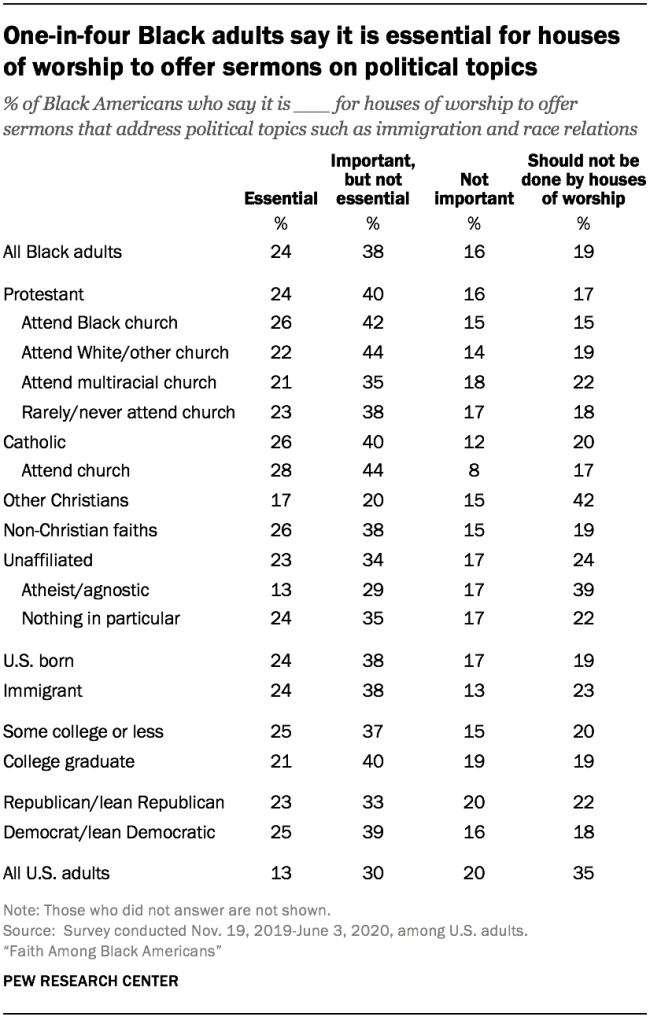
About one-in-four Black Americans say it is essential that houses of worship offer sermons that cover political topics like immigration and race relations. This is far smaller than the shares of Black Americans who see other roles, such as offering spiritual comfort, fellowship, moral guidance, skills training or help with bills, as essential (see Chapter 5 for a comparison). However, most Black adults (62%) say it is at least important, if not essential, for houses of worship to offer sermons on political topics like immigration and race relations. By contrast, 16% say it is not important for houses of worship to offer sermons on political topics, and one-in-five say houses of worship should not offer these types of sermons at all (19%).
Roughly equal shares of Black Protestants (24%), Catholics (26%) and religiously unaffiliated adults (23%) say offering political sermons is essential for houses of worship.
One-quarter of Black adults who identify with or lean toward the Democratic Party say it is essential that places of worship offer political sermons, as do 23% of Black Republicans and Republican leaners. Democrats are somewhat more likely than Republicans to say this is “important, but not essential” for places of worship (39% vs. 33%), while a slightly higher share of Republicans than Democrats say it is not important for houses of worship to offer political sermons or that they should do not this at all.
Black adults are more inclined than U.S. adults overall to say it is essential for houses of worship to offer sermons on political topics (24% vs. 13%). And roughly one-third of all Americans (35%) think religious congregations should not offer this type of sermon at all, compared with fewer Black adults (19%) who say this.
Among Black Americans who attend religious services at least yearly, about one-third have heard sermons on criminal justice reform
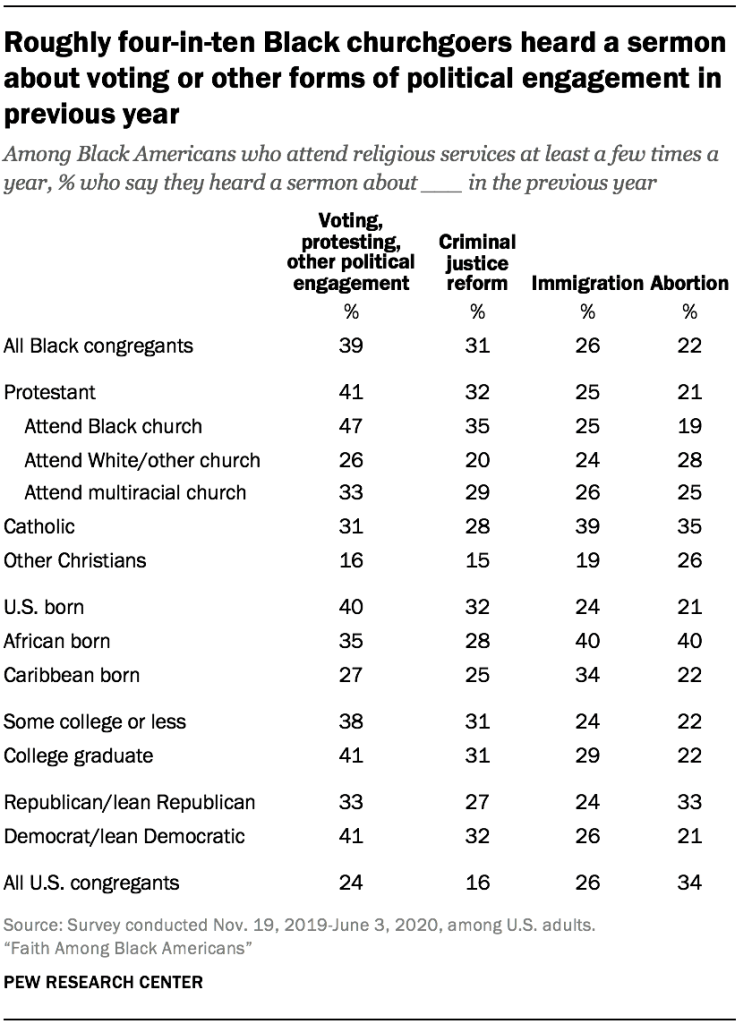
About four-in-ten Black adults who attend religious services at least a few times a year say they heard sermons about voting, protesting or other forms of political engagement in the 12 months prior to the survey. Three-in-ten say they heard sermons about criminal justice reform (31%), while about a quarter (26%) heard sermons on immigration and 22% heard sermons on abortion.
Protestants are more likely than Catholics to report having heard sermons about voting and other forms of political engagement in the 12 months prior to the survey (41% vs. 31%). This is an especially common focus of sermons heard by Protestants who attend Black churches, 47% of whom say they heard such messages. By contrast, much higher shares of Black Catholics than Protestants say they heard homilies that deal with immigration or abortion.
Roughly one-third of Black Protestants who attend a Black church (35%) say they heard sermons about criminal justice reform in the year prior to the survey, as do about three-in-ten Black Catholics (28%) and Protestants who attend a multiracial congregation (29%). Among Black Protestants who attend a White or other race church, fewer (20%) say they heard sermons on this topic in the previous year.
While there are few demographic differences on these questions, Black Democrats are more likely than Republicans to report hearing sermons on political engagement (41% vs. 33%), but less likely to say they have heard sermons on abortion (21% vs. 33%) in the 12 months prior to the survey.
Black adults who attend religious services at least yearly are significantly more likely than attenders in the U.S. general population to say they heard sermons about voting, protesting and other forms of civic engagement.
While most respondents took the survey before the summer 2020 Black Lives Matter protests that were sparked when a Minneapolis police officer killed George Floyd, a July 2020 Pew Research Center survey found that among Black Americans who had attended religious services in person or watched services online or on TV in the month prior to the survey, two-thirds (67%) had heard sermons in support of the recent Black Lives Matter protests, compared with just one-third of White congregants who said the same (32%).
Civic engagement among Black Americans
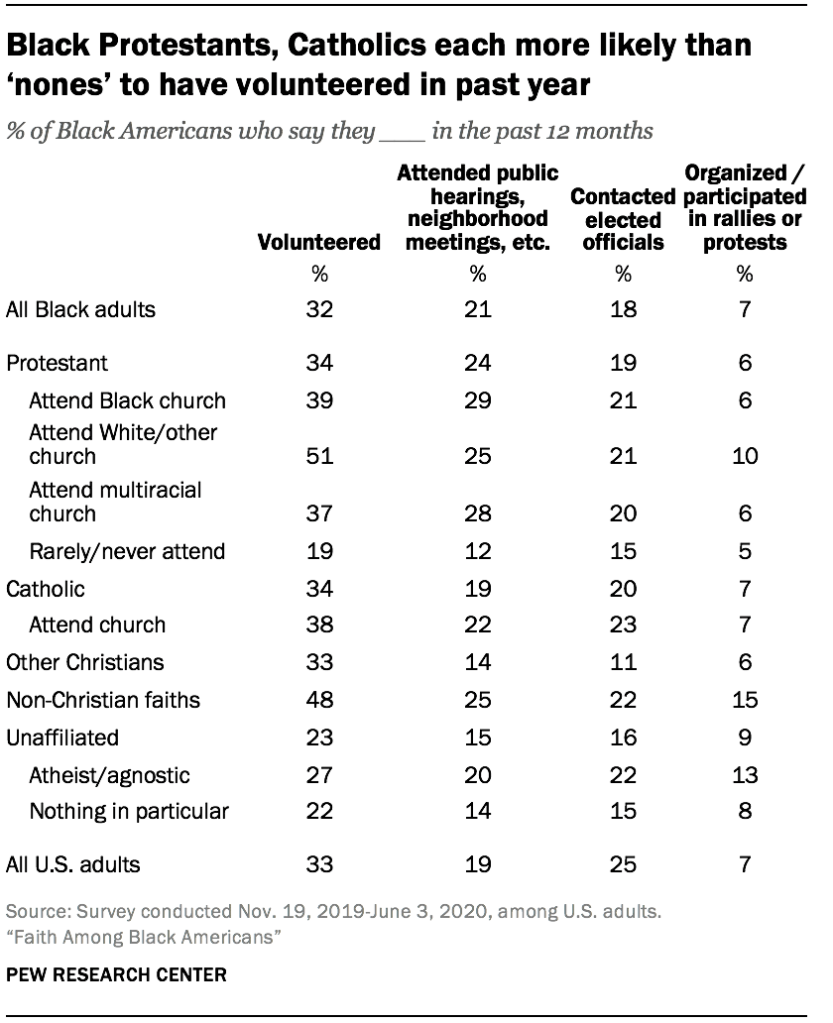
The survey asked respondents if they had participated in four different civic activities in the 12 months prior to the survey: volunteering, attending public hearings or local neighborhood or city council meetings, contacting elected officials, and organizing or participating in rallies or protests.
About one-third of Black Americans say they volunteered in the 12 months prior to the survey (32%). One-in-five Black adults (21%) say they attended a public hearing or other public meeting, and a similar share (18%) say they contacted an elected official. Fewer than one-in-ten say they organized or participated in rallies or protests (7%), although the survey was conducted prior to the Black Lives Matter protests that followed the killing of George Floyd in May 2020.17
Black Protestants and Catholics are equally likely to say they volunteered (34%), but volunteering is less common among religiously unaffiliated adults (23%). Among Black Protestants, 24% say they attended a public hearing or other neighborhood meeting in the 12 months prior the survey, as do 19% of Catholics and 15% of religious “nones.”
Among Protestants, both volunteering and attending community meetings are more common among those who attend church at least a few times a year than among those who seldom or never attend church. And Black Protestants who attend a White or other race church are more likely to say they volunteered in the past year than those who attend a Black church or a multiracial church.
Black Americans engage in most of these civic activities at roughly the same level as the U.S. general population, although Black adults are slightly less likely than U.S. adults overall to say they contacted an elected official in the 12 months prior to the survey (18% vs. 25%).
Black Protestants in White or other race churches more likely to identify as Republican
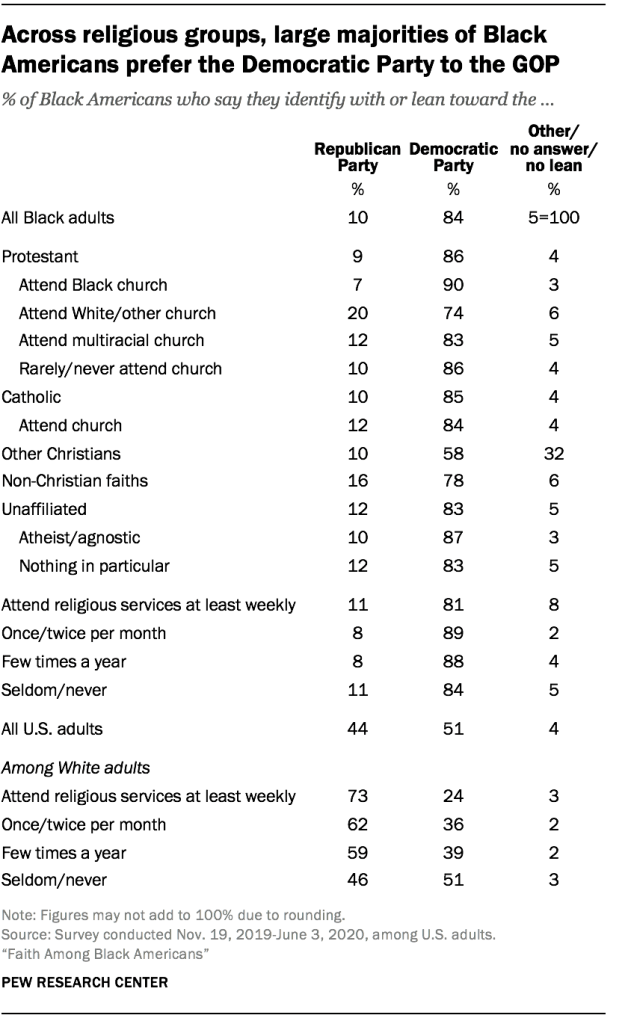
Black Americans are a strongly Democratic group. More than eight-in-ten Black adults (84%) identify with or lean toward the Democratic Party, while just 10% identify with or lean toward the Republican Party. Another 5% do not identify with or lean toward either political party (or did not answer the question). The survey was conducted in early 2020, prior to the presidential election, though Black Americans have long been a staunchly Democratic group.
At least eight-in-ten Black Protestant, Catholic and religiously unaffiliated adults identify as Democrats. Black Protestants who attend a White or other race church (20%) are somewhat more likely than those attending Black (7%) or multiracial (12%) churches to identify as Republicans or lean toward the GOP, though the clear majority in this group also prefers the Democratic Party (74%).
While those who identify with other Christian faiths (mostly Jehovah’s Witnesses) are more likely to lean toward the Democratic Party than the Republican Party (58% vs. 10%), a sizable share leans toward neither party (32%), which may reflect the fact that Jehovah’s Witnesses are taught to remain politically neutral for religious reasons.
The survey finds no link between Black Americans’ levels of religious commitment and their partisanship. Roughly eight-in-ten Black adults who attend religious services weekly identify with the Democratic Party (81%), as do 84% of those who seldom or never attend religious services. This is in sharp contrast to White Americans, among whom there is a strong connection between religiousness and partisanship. Support for the Republican Party is nearly 30 points higher among White adults who attend religious services weekly (73%) than it is among those who seldom or never attend religious services (46%).
Large majority of Black adults think criminal justice system needs major changes or needs to be completely rebuilt
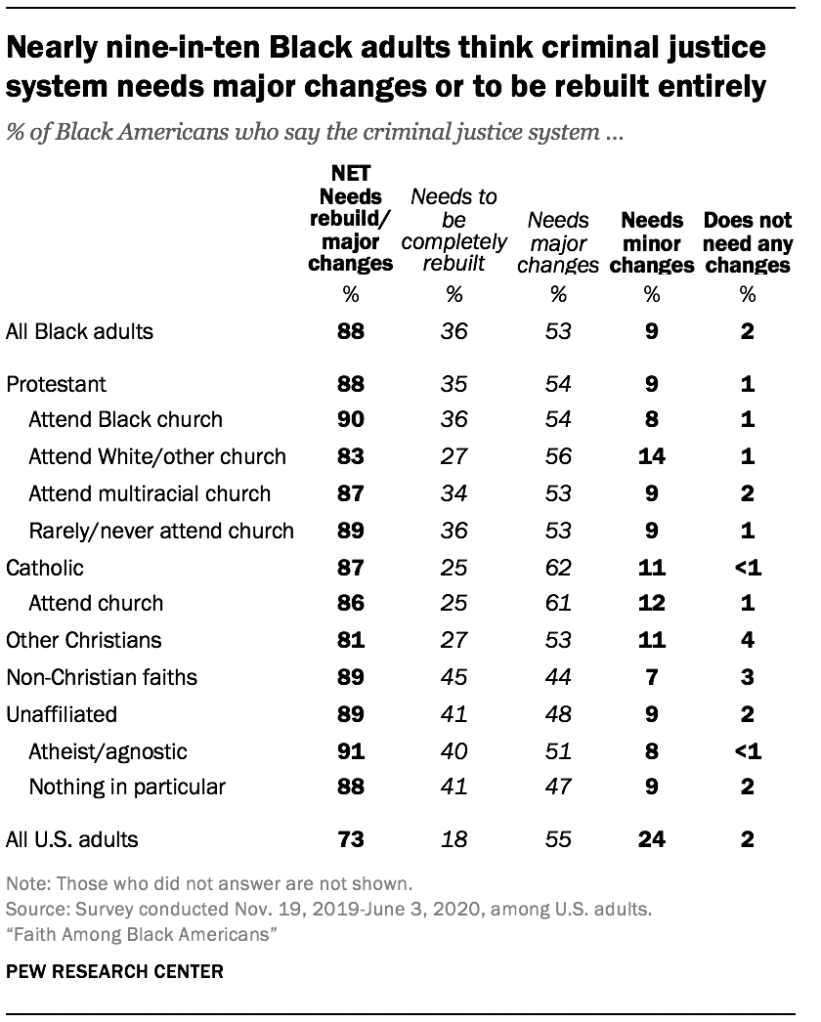
Very few Black adults say they are satisfied with the U.S. criminal justice system. Nearly nine-in-ten say the criminal justice system either needs major changes (53%) or needs to be completely rebuilt (36%). Only 2% of Black adults say the criminal justice system does not need any changes, and 9% say it needs minor changes.
Black religious “nones” (41%) and Protestants (35%) are more likely than Black Catholics (25%) to say the criminal justice system needs a complete overhaul, but all of these groups agree that significant changes are needed. Among Black Protestants, those who attend a White or other race church are less likely than those who go to Black or multiracial churches (and those who rarely or never attend church) to say the criminal justice system needs to be completely rebuilt.
Among Black Americans in Gen Z, 38% say the criminal justice system needs to be completely rebuilt, compared with 30% of Baby Boomers and 24% of those in the Silent Generation. That said, majorities across all age cohorts agree that significant change is needed.
Like Black Americans, most U.S. adults in the general population think the country’s criminal justice system needs significant reform. However, Black Americans are about twice as likely as the public overall to say the criminal justice system needs to be completely rebuilt (36% vs. 18%).
Black adults more likely than U.S. public as a whole to say immigrants strengthen America
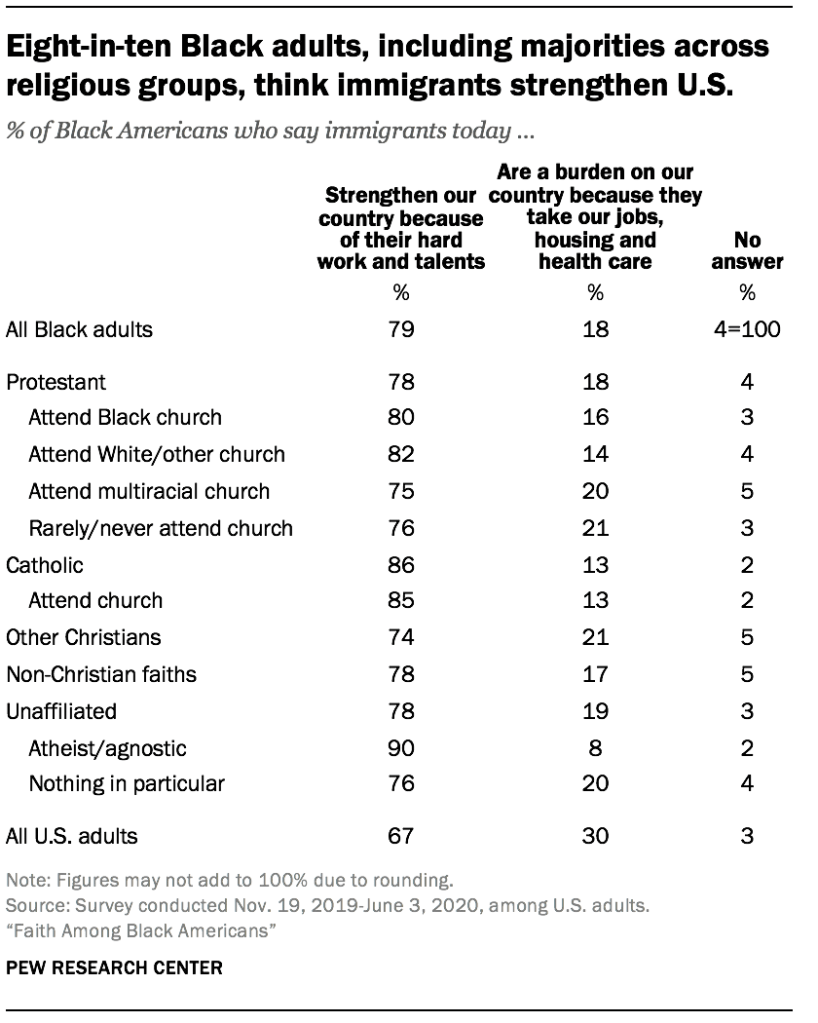
Black adults tend to believe that immigrants strengthen U.S. society. About eight-in-ten (79%) say that immigrants “strengthen our country because of their hard work and talents,” while far fewer (18%) say immigrants “are a burden on the U.S. because they take our jobs, housing and health care.”
A slightly larger share of Black Catholics (86%) than Protestants (78%) or religiously unaffiliated adults (78%) say immigrants strengthen the U.S., but majorities of all religious groups – including other Christians (74%) and members of non-Christian faiths (78%) – share this view.
The largest differences on views toward immigration are between U.S.-born Black adults, among whom 77% believe immigrants strengthen the country, and Black Americans born in Africa or Caribbean (95% and 96%, respectively).
Black Americans are somewhat more likely than the U.S. general public as a whole to say immigrants benefit society, though the balance of opinion among Americans overall is in the same direction. Two-thirds of U.S. adults think immigrants strengthen society because of their hard work and talents, while 30% say immigrants are a burden.
Abortion
Nearly seven-in-ten Black Americans say that abortion should be legal in all or most cases. A smaller share, about three-in-ten, say that abortion should be mostly or entirely illegal.
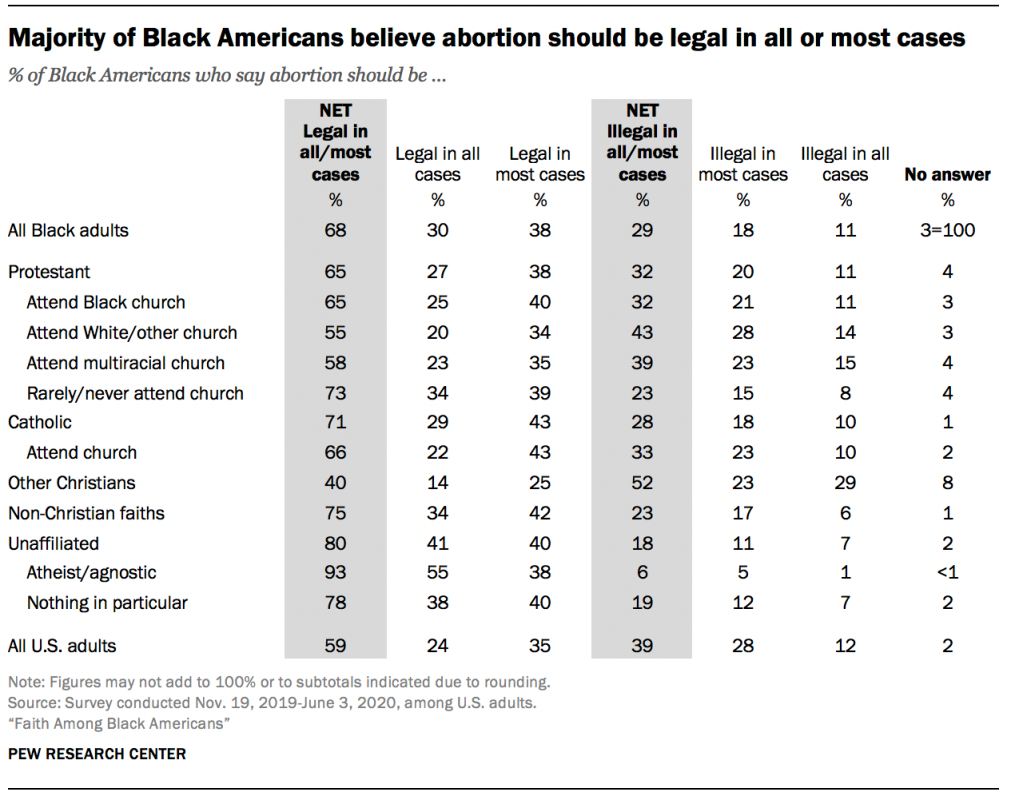
Opposition to abortion is somewhat higher among Black Christians than among the religiously unaffiliated. About three-in-ten Protestants and Catholics say that abortion should be illegal in all or most circumstances, compared with 18% of the religiously unaffiliated who say this. And Black Protestants who attend White or other race churches are somewhat more opposed to abortion than those who attend Black churches.
Among Black adults who identify with a religion, those who say opposing abortion is an essential part of their faith are less likely to support legal abortion than those who do not place such high importance on this issue, though religious duty to oppose abortion does not necessarily translate into a belief that abortion should be illegal. For instance, seven-in-ten of those who say opposing abortion is “essential” to their faith say that abortion should be illegal in all (35%) or most (35%) cases, while 28% say it should be legal in all or most cases. Among those who say opposing abortion is “important, but not essential” to their religious identity, most say it should be legal in all (19%) or most (48%) cases.
Sidebar: Trying to measure the effects of sermons
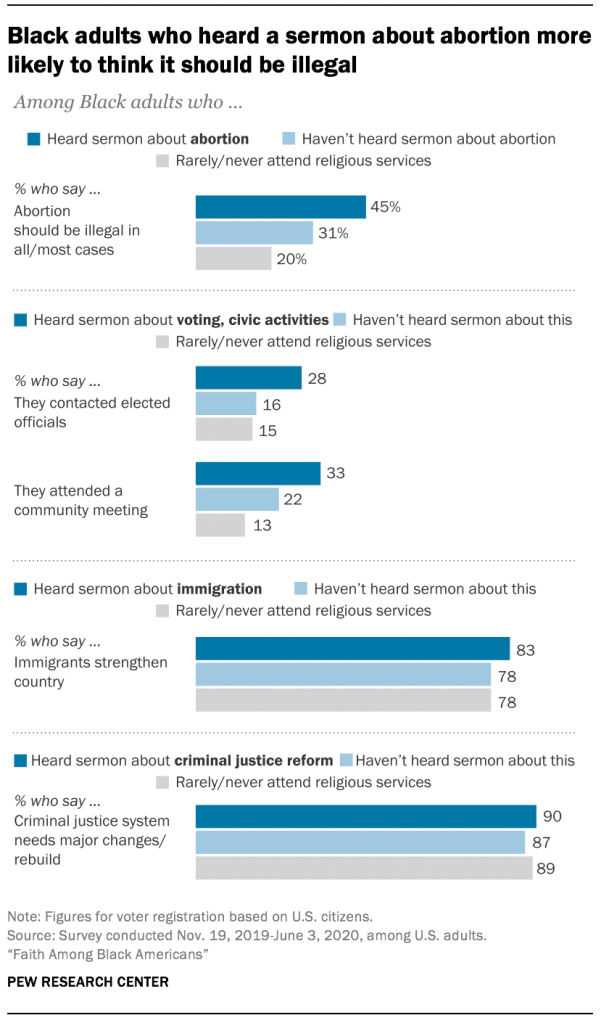
Do sermons affect people in the pews? Do they change minds? Do they lead listeners to action?
It’s hard to know for sure, but the survey finds that for Black adults, listening to sermons on certain topics at religious services is associated with differing views on those topics, or with varying levels of engagement in some types of civic activity.
For instance, Black attenders who say they heard a sermon about abortion in the 12 months prior to the survey are more likely to say they oppose abortion than those who did not hear sermons on the topic. They also are more likely to oppose abortion than adults who rarely or never attend religious services. (The survey did not ask if the sermons were in support of, or in opposition to, legal abortion, only if they had heard a “sermon, lecture or group discussion” that dealt with abortion at their church or house or worship in the previous 12 months.)
Similarly, Black adults who attend services and heard a sermon about the importance of voting and other forms of civic engagement are somewhat more inclined than those who did not hear sermons on these topics, or who rarely or never attend services, to say that they are registered to vote, that they contacted elected officials, or that they attended public hearings or community meetings in the 12 months prior to the survey.
The survey finds less of a link between hearing sermons on the criminal justice system and immigration and the views of Black respondents on these topics.
Of course, the survey cannot determine the causal direction of these findings. It could be that hearing a sermon about a social or political issue changes some respondents’ opinions and behaviors. Conversely, respondents who consider these topics to be important could be seeking out places of worship that offer sermons on these issues, or that align with their existing social and political views.18




